Let's take
control of our future!
This article and its supplementary pages have photos and descriptions
of some of the meals that I've made for myself, but I am not trying to
promote any particular food or recipe. Rather, I am trying to encourage
you to
realize our potential. Modern
technology provides us with an unbelievable
number of opportunities in regards to meals, farms, restaurants, economic
systems, clothing, cities, transportation devices, parks, furniture, and
even television shows! As I've mentioned in other files, once in a while
we should stop working and ask ourselves,
"Where have we been? Where are we going?"
We shouldn't be passive creatures who accept what life
gives us. We should get into the habit of discussing our incredible
opportunities, and becoming active participants in shaping our future.
I will now give a few examples. I will start with the refining of wheat
into white flour.
Where are we heading with
the processing of wheat?
Our ancestors had to struggle to produce wheat, oats, rice,
and other grains, and their crops were often contaminated with rotten grains,
insects, dirt, and bacteria. Modern technology allows us to produce large
amounts of healthy grains, and we can easily clean them of dirt and bacteria.
We can also deliver them to any location in the world while they remain
fresh.
Unfortunately, our primitive economic system encourages us to concentrate
on profit, not the nutritional value or flavor of our food. As a
result, many decades ago businesses began removing most of the nutrients
from the wheat grains in order to produce a flour with a
longer shelf life. Other businesses then baked that nutritionally
worthless, tasteless flour into breads, pizza crusts, and pastas. The end
result was that our medieval ancestors were usually eating better tasting,
more nutritious, and much fresher bread products than most of the people
today!
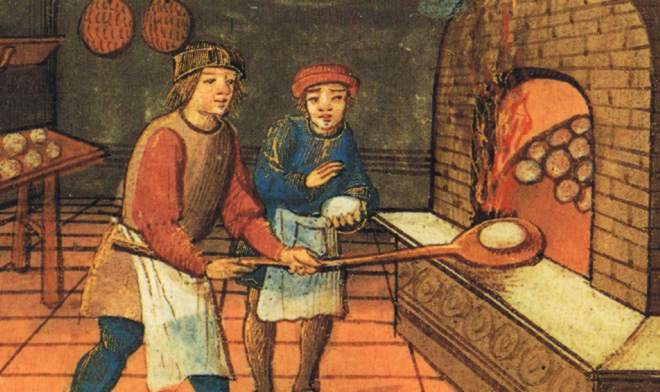
Eventually people discovered that the processing of wheat was
causing health problems. However, rather
than react to the health problems by returning to less processed foods
until we learn more about health and nutrition, businesses reacted by fortifying
their refined foods with some of the missing nutrients.
Even if fortified bread is just as nutritious as freshly ground, whole-grain,
freshly baked bread, I prefer the fresh bread that I make for myself because
I prefer its flavor over the bland,
refined bread. I would rather change the course that the human race is
on and put more emphasis on the flavor, quality, and nutritional value
of our meals, rather than continuing on the path of maximizing profits
and sales.
Asians suffered health problems
from polished
rice

By the 1800s, technology had allowed businesses to "polish"
rice grains, and most consumers were attracted to the polished rice. People
in that era did not know much about health or nutrition, so they didn't
realize the polishing of rice was removing some very important nutrients.
Lots of Asians began suffering from beriberi.
At the same time, businesses in America and Europe were selling medications,
sodas, and other products that had cocaine or morphine in
order to create some addicted customers.
The polishing of rice, and the addictive drugs in Coca-Cola soda and
medical products, are more examples of how our crude economic system rewards
people only for making a sale. There is absolutely
no concern for whether a product has any value, or whether it
is dangerous. There is absolutely no
concern for whether anybody does anything useful for society.
We are trying to fix this crude economic system by passing laws to control
the behavior of businessmen, but this is idiotic. It is foolish to use
an economic system that encourages us to sell products with no regard
to the consequences, and then try to pass laws to force us to care
about the consequences. We need to design an economic system that is more
appropriate for this modern era. We need a new philosophy towards
life, and a new society.
Where are we going with caffeine?
For optimum health, we need to keep certain chemicals within
a certain range, and we need to keep certain dangerous chemical below a
certain level. Fortunately, our body has evolved the ability to regulate
some of the chemicals that we need. For example, our body regulates its
consumption of oxygen to such an extent
that none of us need to be concerned about our oxygen levels, aside from
people who are suffering from medical disorders.
Likewise, everybody should have
the ability to regulate their consumption of water.
We shouldn't have to force ourselves to drink water, as many of the self
appointed health experts claim. We should be able to let our body tell
us when we need water. However, none of us have evolved the ability to
regulate or even sense our consumption of certain other chemicals, such
as arsenic and caffeine, so we have to consciously watch our consumption
of those chemicals.
What effect does caffeine have on us? How does caffeine affect us at
different ages? How many foods have caffeine? What level of caffeine is
in the various food products that we consume? Since caffeine stimulates
our kidneys, does it also increase our requirements for some of the water-soluble
nutrients, such as vitamin C or salt? If so, it would be further justification
for designing society so that each of us is provided with routine analyses
of our health, and taking into account our caffeine consumption in addition
to our physical size, age, food preferences, job, leisure activities, and
climate.
The Hershey's chocolate company has this
table of caffeine levels in some of their products, but what do the
numbers mean? For example, a small bar of their dark chocolate has 25 mg
of caffeine and 179 mg of theobromine, but what do those numbers mean to
me or you? If you consume chocolate,
soda, coffee, or other foods with caffeine, do you ever consume so much
that it has an adverse effect on your
health
or your mood? Are there any children
consuming these chemicals to such an extent that it is interfering with
their life?

Ideally, businesses would provide information about the caffeine
level in each of their products, and our society would provide each of
us with routine medical examinations to help us understand our particular
body and its characteristics. People who consume caffeinated foods and
drinks should be able to have analyses done to determine how their body
reacts to caffeine. This would allow them to control their consumption
of these chemicals.
How does caffeine affect
people with blood sugar problems?
When I was younger, I didn't like the effect of caffeine, but
by the time I was in my 40s, I preferred to have a small amount of coffee
in the morning, and small amounts throughout the day until I decided to
eat a meal. I discovered that the effect is useful only when I maintain
fairly low caffeine levels, such as having a quarter cup of coffee every
couple hours. If I drink just one large
cup of coffee in the morning, then I become thirsty, and my body doesn't
feel as relaxed as it normally does.
Furthermore, I've noticed that I don't like the effect of coffee if
I drink it during or soon after a meal. I suspect that when I eat food,
my blood sugar levels are going slightly too high,
and that the caffeine worsens the situation. As a result, I avoid caffeine
during and after meals. Coffee is beneficial to me only when I am hungry.
I assume that the caffeine is compensating for some problem I have,
perhaps by increasing my blood sugar levels, but I don't know. Unless a
person's blood sugar reaches extreme levels, doctors cannot be sure whether
there is a problem with people like me, whose blood sugar levels stay within
the "normal" range. Unfortunately, the "normal" range for many chemicals
is very large because we really don't know much about the human body.
How does your body react to
caffeine? Would you benefit from small amounts of caffeine when you are
hungry? What effect does caffeine have on children?
Does it cause trouble for any of them? Should we restrict the caffeine
consumption of children?
We need to alter our society so that we can support research into these
issues with no regard to developing a profitable product. We should know
how much caffeine is in our food and drinks, and we should be able to get
routine medical analyses to determine how caffeine affects us, and how
our reaction to caffeine changes as we grow older. I suspect that if we
were to analyze the effect that caffeine has on us at different ages, we
would discover that caffeine is worthless for most children, a problem
for some children, and useful mainly to older adults. It may also be useful
for certain types of medical disorders. I suspect that we would come to
the conclusion that it is best to restrict
the consumption of caffeine for most children.
We should have access to
freshness dates
of food
Our primitive ancestors gathered their own food, so they knew
exactly how fresh their food was. Today we depend upon other people to
produce, distribute and process food for us. Ideally, farmers and businesses
would clearly identify the dates at which the food was processed so that
we could get some idea of its freshness, but our crude economic system
causes businesses to focus on profit and sales, and so the businesses and
farmers have a tendency to hide the
dates that food was produced. You don't
benefit from this, and neither do I.
So why do we tolerate it?
We are fools
to tolerate an abusive economic system

Many people consider it patriotic
to support their society, but it is not
admirable to support a stupid, crude, primitive economic system in which
businesses, doctors, and scientists are encouraged to treat us like animals
to exploit for money. We should stop
acting like stupid fish and develop
an economic system and society for our new era. Businesses, scientists,
and everybody else, should be encouraged to improve
society.
We ought to be disgusted that our
current economic system is encouraging us to look for ways to manipulate,
exploit, and abuse one another. We should be appalled that our current
economic systems rewards us for finding ways to circumvent laws. We should
develop an economic system in which people are rewarded only
when they do something that is truly beneficial
to society; an economic system that encourages us to impress and
inspire
one another.
The people who proudly support incompetent government officials, abusive
economic systems, corrupt policemen, disgusting crime networks, ineffective
school systems, etc., should be regarded as stupid,
patriotic fish.

I have heard top executives boasting
that their primary concern is their stockholders,
or corporate
profits. These executives
don't
care what they do for a living. They remind me of
stupid
dogs chasing after a bone on a race track. They are not
leaders! They seem to have achieved their executive positions
through their aggressive, abusive, and neurotic behavior. Many of them
also seem to be involved with crime networks.
Businesses have no incentive to provide us with serious information
about the caffeine content of their food, or the date at which food was
produced, and medical doctors and research scientists have no incentive
to help us to understand our body, or how it changes as we grow older.
Instead, everybody is struggling to manipulate us into purchasing some
product, and with no regard to whether the product has value to us, or
whether the product is actually harmful! For example, Starbucks is selling
an enormous
cup of coffee - larger than most people's stomachs! - but they have
no concern that some people may be getting excessive amounts of caffeine
from such absurd quantities.
Businesses have no incentive to
be concerned about whether their products are useful or harmful.
Anybody who promotes the philosophy that we should remain on the path that
we are currently on should be considered as a jerk; a fool;
a savage who is out of place in modern
society.
How should coffee and tea
be processed?
The businesses that provide us with coffee, tea, chocolate,
and other caffeinated foods always boast that their particular product
is the best, but every food product should have a serious description of
what it is so that we can distinguish between them, and make judgments
on what quantity to consume.
Coffee is an excellent example because there is a wide range of processing
methods. At one extreme are the coffees that have a very light roasting.
One brand that I tried reminds me of a wheat tea
more than coffee. At the other extreme are the coffees that are roasted
to the extent that the bean turns black and crumbly. I don't like the "charcoal
flavor" of those coffees, but they are excellent as flavoring agents for
candy, yogurt, and ice cream.

It's obvious that the different coffees have different flavors,
but what is their effect on our health? Does the roasting process
cause any dangerous chemicals to develop? Is it better to roast the coffee
until the beans becomes black? Or is it better to give the beans a very
light roasting?
After a coffee has been roasted, it is packaged and shipped around the
world to consumers, but once consumers open the package, what does the
oxygen do to the coffee? Does the oxygen merely alter the flavor? Or does
it allow toxic chemicals to develop?
Consumers have different ways of producing coffee. At one extreme, we
can put coffee grounds into water, and then let the mixture sit in our
refrigerator for a day or more. The result is a relatively mild coffee.
At the other extreme, we can boil the coffee in water for long periods
of time. This results in stronger, more bitter coffee, but are those bitter
chemicals dangerous to us? Or are they beneficial?
The same concepts apply to tea and chocolate. For example, some people
claim that tea leaves should not be pasteurized, and some people advise
us to make tea by letting it sit in cool water for a day rather than boil
it. We ought to change our society so that we can provide ourselves with
business executives and scientists that we can trust and respect, and who
investigate these issues and provide us with serious
information!
Where are we heading with
wine and other
beverages?

Thousands of years ago people produced wine by harvesting whatever
grapes were growing in their particular area. The farmers didn't have access
to specially bred varieties of "wine grapes" or "champagne grapes" that
produced large crops of grapes with extreme sugar levels, and which would
ripen at the same time, thereby making it very easy to harvest large amounts
of very sweet grapes.
Our ancestors also had to use crude methods to crush
the grapes, and they didn't have the technology to separate the juice from
the solid materials. The end result was that the wine was made from grape
juice that was full of pulp, and lots
of pieces of grape seeds and
skins.
The fermentation process was crude, also, so the alcohol content never
would have reached the high levels of wine today. The end result is that
their wine had a lower alcohol content,
less
sugar, and a lot more nutrients.
During the past few centuries, farmers have been breeding grapevines
to produce extremely sugary grapes. Modern technology allows us to crush
the grapes with such precision that we can prevent pigments from the skin
and seed from getting into the wine, thereby allowing us to produce white
wines. And all modern wines are free of pulp. Modern technology also allows
us to control the fermentation with such precision that the alcohol content
can reach the maximum level possible with the yeast of today. The end result
is that the wines of today, especially the white wines, have little or
no nutritional value, a very high alcohol content, and sometimes a high
sugar level.
So, where is the human race heading in regards to wine? Will farmers
develop new varieties of grapes that have even higher levels of sugar?
Will scientists develop new strains of yeast that can produce even higher
levels of alcohol? Will wine producers of the future produce wine that
has even less nutritional value?
What is the purpose of wine? Why do we bother to produce it? Our society
is putting a lot of land, people, and other resources into the production
and distribution of wine, but who among us is benefiting from wine, and
what exactly is the benefit? Why does
wine need a high level of alcohol?
Rum, brandy, Bailey's Irish Cream, and some other drinks have nice flavors,
so they are useful as flavoring agents for foods, sauces, and desserts,
but they are not practical as beverages
because of their high alcohol levels. Apple cider and apple juice taste
good, but some of them are so full of sugar that they are like a liquid
candy rather than a nutritious and practical fruit drink. We
are also producing a lot of sodas today, such as Coca-Cola and Pepsi, but
what value do any of them have?
Where are we headed in the development of beers, sodas, apple cider,
and other drinks? I suggest we start experimenting with fermented drinks
in which the alcohol content is much lower
and the nutritional value is higher.
I would bet that the human mind has enough intelligence to develop a wide
variety of beers, ciders, wines, rums, and other drinks that
have a very low alcohol content and a lot more nutrients. And I would also
bet that we can come up with non-alcoholic drinks that are better for our
health than the current group of virtually worthless, high sugar drinks.
Where are we going with wine
glasses?

We should occasionally stop and review everything
that we do, such as analyzing the furniture in our home, the playgrounds
that we build for schools, and the glasses that we use for drinking.
For example, wine glasses are very delicate, and I suspect that a lot of
them break every year. In our current economic system, businesses benefit
from such waste by selling replacements, but we ought to stop and ask ourselves
such questions as,
"Doesn't the human race have the artistic
creativity and engineering talent to design wine glasses that are both
attractive and durable? And why are we continuing to tolerate a
crude economic system in which businesses benefit from misery, disasters,
and waste? Don't we have the ability to create an economic system that
encourages cooperation, efficiency, and improvements to society?"
Where are we going with food
for
children?
Most adults do not provide
guidance to their own children, and especially not to other people's
children. Instead, most adults behave like stupid animals who titillate
themselves with children. Most adults play with children; they don't
raise
children. Most adults do things to cause the children to smile, giggle,
and laugh. They use the children as entertainment devices; they
do not treat them as young humans who
will become the next generation. To most adults, especially women, a child
is like a dildo to stimulate themselves with.
As a result of this crude attitude, schools try to please children rather
do than what is best for the children. For example, schools are providing
children with flavored milk drinks, but how do children benefit
from these drinks?

First of all, some of the chocolate milk drinks may
have caffeine, which might cause trouble for some children. Second,
the high sugar levels might cause trouble for some children. And finally,
a lot of people have bad reactions to milk, so it might be better if we
stopped promoting milk. For all we know, milk is one of the few products
that should be extremely processed,
such as by letting bacteria decompose it into yogurt or cheese.
School should not give children what the children want. Instead,
adults should analyze all of our foods and beverages and develop drinks
and foods for children that are both tasty and healthy for them.
Let's change the course we
are on!
We should stop behaving like stupid
fish and ask ourselves, "Where are
we heading with our food processing technology?" We are producing
a lot of extremely processed foods, such as potato chips, salami,
and Coca-Cola, but are these causing us health problems? Will future generations
create even more varieties of nutritionally worthless and potentially
dangerous bread products, sodas, sandwich meats, and snack items? Or will
we change the course of the human race and start putting serious
effort into the research of food and nutrition, and start providing ourselves
with meals that are flavorful, nutritionally valuable, and healthy?
Let's get rid of the parasites!
Judging by the way most people complain about the price of
oil, the corrupt politicians, and the price of food, I suspect that most
people have been fooled into thinking that their primary burden in life
are the oil companies, the farmers, and the politicians of the opposing
party. In my opinion, our primary burden is not the oil companies. Rather,
it is the banks, landlords, tax collectors, insurance companies, and other
parasites who are trying to make money from our hard work. These parasites
are putting a burden on every business, and every individual.
Most parasites are invisible!
Most people don't realize that society is full of parasites
because most of the parasites are in government and corporate offices.
We don't see the worthless office workers. Instead, we see the farmers,
waitresses, car mechanics, and cashiers. We come into contact primarily
with people who are doing useful work for a living, not the parasites
who are doing nothing of value.
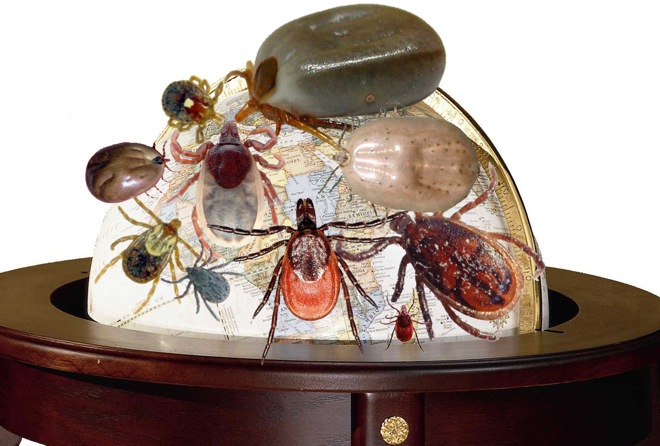
We need to develop a new society so that nobody can make a
living by taking a percentage of our work, or getting royalties over and
over. Farmers and restaurants should be concentrating on providing us with
fresh, tasty, and nutritionally valuable foods rather than providing large
amounts of money to banks, landlords, tax collectors, and other parasites.
Students and old people could
get involved with analyses of food and drinks
As I've mentioned in other files, schools should provide the
older students with assignments that are actually useful to society so
that they can do something productive while they learn a skill, and we
should also set aside jobs for old people so that they can do something
useful. We shouldn't have adults in the prime of their life doing something
that a child or an old person could do.
In regards to food and nutrition issues, a lot of data has to be collected
and analyzed, and both students and old people would be able to assist
with those type of tasks. By getting lots of students and old people involved,
we could speed up the progress of some of these research projects compared
to the situation we have right now, in which small groups of scientists
are trying to do all of the work by themselves. And this leads me to the
next issue I wanted to bring to your attention; namely, my crude, informal
experiments with hot peppers and basal
cell carcinoma.
A status report on my use
of Capsaicin
|
A few years ago I had three small spots on my face in which the skin
was growing at excessive rates, thereby causing flakes of dry skin to fall
off periodically. Those spots matched the description of basal
cell carcinoma. During the past few years I've been eating dried red
chili powder, black pepper, and fresh Haberano peppers (in the photo) in
order to see if I can get rid of them with hot
spices. I also experimented with rubbing some Haberano juice and some
red chili powder directly onto the troubled areas, but that was so inconvenient
that I didn't do it very often. |
|
 |
|
The two green arrows in this photo point to the two larger spots of
basal cell carcinoma, but today they are just faint red splotches. The
dry, flaking skin is gone!
The blue arrow is pointing to the vicinity in which there was one other
smaller, less developed, basal cell carcinoma. The hot peppers seem to
have eliminated it completely, perhaps because it was less advanced than
the other two. I am not exactly sure where it used to be, but it was so
close to my eye that it was frightening to think that it might turn into
cancer. |
|
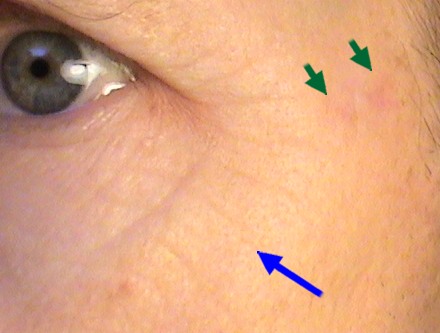 |
|
The two ovals in this photo show close-ups of the areas that the green
arrows are pointing to. As you can see, there is no dry or flaking skin,
but the skin is not completely "normal" yet.
My conclusion is that the chemicals and these hot peppers
really do have an ability to suppress, and/or eliminate certain
types of skin problems. |
|
 |
Three, unexpected benefits from
the hot peppers!
I discovered some unexpected benefits to large amounts
of these hot peppers:
1) I can now breathe properly through my left nostril! For many
years I've noticed that something seems different about my left nostril,
as if it was swollen deep inside, thereby restricting the flow of air.
Also, the left nostril would produce excessive amounts of mucus. Months
after eating larger amounts of the Haberano pepper, I noticed that I can
breathe properly, and I didn't have the problem of excessive mucus any
longer! Apparently the Haberanos fixed whatever was wrong with the inside
of my left nostril. Hopefully it is a permanent
fix.
2) I had a small, dark mole on my chest that has existed for as long
as I can remember, and it was apparently the first victim of the hot peppers.
I wasn't paying any attention to it, but one day I noticed that it seemed
dry and hard, and after a few more weeks, it fell off, and now all that
remains is a discolored dot on my skin.
3) The little spots of dry skin on both of my arms began to vanish!
My skin is noticeably healthier now.
We may be denying ourselves safe
and effective medical treatments!
It's possible that a small and continuous consumption of hot
peppers can help reduce certain medical problems. It's also possible that
in high doses they can get rid of the more established cancers, but then
you have side effects to deal with.
One of the purposes of this particular article on food is to explain
why we need to change society. It's important for you to realize
and understand such concepts as:
1) If it turns out that hot peppers are more effective or safer
than chemotherapy or other treatments for certain types of medical problems,
then all of us are suffering as a result of our crude society in which
doctors, medical personnel, scientists, and all of the rest of us, are
encouraged to make a profit and exploit a person's
misery rather than look for ways to improve our lives.
2) Even if you don't have basal cell carcinomas, it is in your
best interest for society to develop low-cost and safe solutions to our
medical problems because it allows all of us to live among people who are
healthy and happy, and it reduces our overall healthcare expenses. Furthermore,
some natural methods might create less pollution than the artificial chemicals
since the natural chemicals are recycled by nature, and you would benefit
indirectly from a reduction in pollution.
The fresh
peppers may be better than the powders
I started by eating about a half of a jalapeno, and eventually
I could eat an entire jalapeno, and later one half of a Haberano. I have
also experimented with red chili powder and black pepper. There seems to
a difference between them. The Haberanos seem to have a more volatile form
of the chemical(s), or perhaps there's just more of the chemical in the
Haberanos, or maybe it's just a more "active" form. It would be nice if
we had honest scientists who would study these issues with no regard to
profit.
What are the side effects?
As with any dangerous chemical, these hot peppers have side
effects. In large amounts, it annoys my stomach and/or digestive
system, and in even larger doses, it seems to interfere with digestion
and the healing of wounds, and it makes me feel miserable, either by interfering
with my brain, or by upsetting my body, which in turn affects my mood.
One day I decided to try a large dose of black
pepper, so I ground up a spoonful or two, but I didn't feel too good
afterwards, so I'm not going to do that again. Besides, the black peppers
are an expensive form of that chemical, assuming it's the same chemical!
The most cost-effective form seems to be fresh Haberanos. The fresh peppers
also have the advantage that it's difficult to "overdose" on them because
they have such a volatile form of a chemical that you can't eat much of
them. By comparison, if you put some powdered red chili powder into some
food, you can quickly consume a large quantity without realizing how much
of the chemical you are eating. Incidentally, the way I eat those horrible
peppers is to cut it into pieces, mix the pieces with some other food,
and then swallow it without chewing it.
|
This photograph shows a scratch on my little finger, and the area around
it has turned red and sore. This has happened a few times after eating
a Haberano.
This
article claims that these hot peppers can increase our metabolism, so maybe
that would explain why I've lost about 10 to 15 pounds during the past
couple years. Most people might be happy to lose weight, but I didn't have
even 5 excess pounds, so I lost muscles that I need!
I was worried that I lost weight simply due to deterioration from old-age,
so after posting this article, I significantly reduced my consumption of
these chemicals to see if I can gain back some of my weight.
|
|
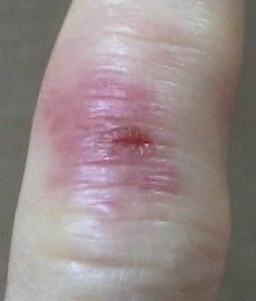 |
Can applying this chemical externally
be useful?
After I began consuming these hot peppers, a scab developed
over a small portion of my ear, apparently because there was a skin problem
on my ear, also. However, that scab will not go away! Perhaps that portion
of my ear doesn't have enough circulation to fully heal, or perhaps the
skin in that area is different than the skin on my face. I plan to once
again try experimenting with putting the chemical directly on that spot
to see if I can get rid of it.
Should we eat the seeds
of the hot pepper, also?
Another issue that needs to be investigated is whether the
most effective chemical in these peppers is in the seed or the flesh. It's
possible that as the seed passes through our digestive system, some of
the chemical leaks out along the way, thereby giving us a continuous dose,
and exposing the intestines to the chemical, which may be useful... or
maybe it's harmful! We need some honest scientific research into these
issues!
Because each person is slightly different, we have to do a lot of data
collection and analyses in order to understand such issues as hot peppers,
and this is why I mentioned earlier that I think it would be very important
to alter society so that we can get more students and old people involved
with some of these experiments.
There are not
many coincidences
Have you noticed how many societies have a habit of eating
some type of hot spices? The foods that a society eats may seem to be a
coincidence based upon their environment, but that isn't true. The food
that we enjoy eating are the result of the brutal struggle
for survival. For example, a person who is born with an attraction
to poisonous or inappropriate foods is less likely to survive and reproduce
compared to a person who happens to be attracted to foods that keep him
in better health. Therefore, the reason societies around the world developed
a tendency to add hot spices to their food is likely to be because the
people who were attracted to the spices were slightly better at surviving
life, perhaps because the spices helped to suppress cancers, bacteria,
viruses, and/or other ailments.
Life doesn't have many coincidences. There is an explanation for virtually
everything that happens, although we may not be able to figure out or understand
all of the explanations.

Why did the Japanese develop the custom of eating raw
fish? And why, when they eat sushi, do they also have a tendency
to combine it with spicy green wasabi
and pickled ginger? I suspect that
the custom of eating raw fish developed long ago when their diet was primarily
rice, which didn't provide a lot of nutrition or protein, and the fresh,
raw fish provided more nutrition than stale, cooked fish. Perhaps the spicy
wasabi was suppressing certain bacteria or parasites in the raw fish of
earlier centuries, and perhaps the pickled ginger was helping with digestion.
The way people eat, dress, work, and treat each other is not due to
coincidence. All societies are in a battle for survival, and the survivors
are those whose behavior is more appropriate. We can see this happening
right now all around the world in regards to crime, homelessness, retardation,
and corruption. The societies that are doing the least
to stop corruption, retardation, and crime are deteriorating at a faster
pace. Over a long period of time, the races and societies that do the best
job of taking care of themselves will dominate.
Farmers markets are impractical
today
A lot of cities are trying to solve the problem of low-quality
fruit and vegetables by setting up "farmer's markets" that are similar
to those of the Middle Ages, but we are fools to try to re-create the past.
We should not even try to maintain the present! We should instead
consider the incredible opportunities that modern technology provides us,
and design a society for this new and modern era.
The farmer's markets were practical centuries ago because people lived
among farms. The farmers had only a short distance to travel in order to
take their food to the market. However, in modern cities, the farmer's
markets are often a long distance away from the farms.
I recently bought some cherries from a woman at our local farmer's market.
Cherries do not grow in my city, so I asked her where the cherries came
from, and she replied that they were from a farm that was several hundred
miles away. I have never been to a cherry orchard, so I asked her about
the harvesting of cherrys, and she told me that she had never been to a
cherry orchard, either! She told me that the farmer delivers cherries to
her once or twice a week, and then she travels to a few different markets
to sell the cherries. Like many of the people selling food at the farmer's
market, she is not a farmer, and hasn't even visited the farm that is producing
the food she sells. She is just an ordinary salesclerk.
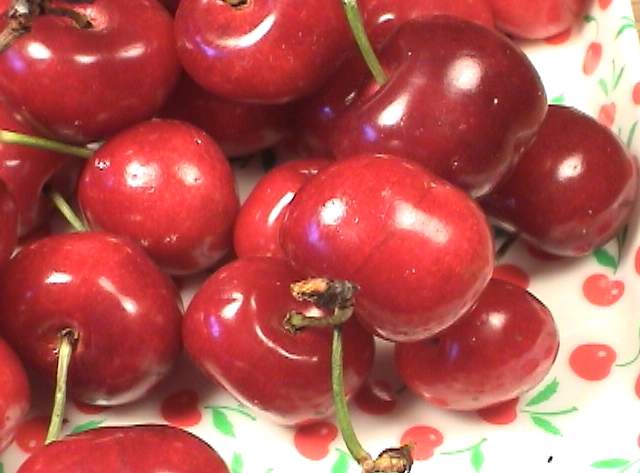
Later that afternoon I picked up a package of cherries at the supermarket
to see if there was any difference, but I didn't notice any difference
in appearance, flavor, ripeness, or quality. Actually, the cherries from
the supermarket (photo above) had slightly less
damage because they were packed in individual plastic containers,
whereas the cherries at the farmer's market were sitting in crates, and
customers had to pick them up with their fingers and put them into bags.
Therefore, cherries from a farmer's market end up with more
bruises!
The modern farms, distribution systems, and markets can provide higher-quality
fruit and vegetables because they can afford high quality trains and trucks
with cushioning and refrigeration. By comparison, the people transporting
food to farmers markets are often driving low-cost pickup trucks, and they
rarely have refrigeration. Also, the food at the large supermarket is delivered
only
once. By comparison, the unsold food at the farmer's market
is packed up and transported to another
farmer's market. By the time somebody purchases the food, it may have been
packed and unpacked many times. As
a result, food sold at a farmer's market has often suffered a lot more
vibration and bruising, as well as high temperatures.
Let go of the past and blaze
a new trail for
our future!
We should not follow the philosophy of trying to maintain everything
as it is right now. We should not try to fix our primitive economic system,
or try to re-create the farmer's markets of the Middle Ages. Instead, we
must face the fact that technology has dramatically altered life for humans.
We are not primitive savages any longer. We need to design an economic
system, a legal system, etc., for this new and modern era. Farmers markets
are not practical for fruits or vegetables, and they are especially impractical
for fresh meat. During the Middle Ages,
farmers would take live chickens and other animals to the markets, but
that would be ridiculous in our era.
We have to stop behaving like stupid fish and start analyzing
where the human race has been, and then we have to make decisions about
where we want to go for our future. We should design our society for our
new technology. We should not try to duplicate the past.
In order to fully benefit and enjoy our new technology, we have to develop
a better economic system, a better government system, a better school system,
etc. We should not fool ourselves into thinking that we can improve our
transportation systems simply by funding a few high-speed train lines,
or an electric automobile, or that we will fix our school system by making
some change to the curriculum. We need to start over. We need to
redesign our cities, redesign our transportation systems, redesign our
economic system, and redesign our school system.
Would better
meals create a better behaved
population?
When animals are suffering from any type of discomfort, even
at a mild level, it can have an effect on their mind and behavior, such
as by making them slightly more irritable, or interfering with their concentration.
With humans, a mild discomfort can also result in our spending a lot of
our time fantasizing about and searching for happiness through money, fame,
sex, traveling, gambling, drugs, alcohol, pets, religion, and children.
The world is full of miserable people, and I think the worst of this
misery is due to genetic defects that we have no ability to understand
or fix. However, from my experiences with food, I think there are a lot
of people who are suffering from a very mild but perpetual discomfort as
a result of their unnatural diet, and that this endless discomfort is having
a detrimental effect on their attitude and behavior. And I also suspect
that it is one of the reasons that some people have a tendency to overeat.
If my suspicions are correct, then if we could fully understand health
and nutrition and provide everybody with healthy meals, then we would notice
a slight decrease in overeating, and a slight increase in overall happiness,
which in turn would create a slightly nicer society for all of us, and
we would also notice people are doing slightly better at their jobs because
they can concentrate more, and because they have a better attitude.
A lot of people believe that they are already
eating healthy meals, but we don't really know much about health or nutrition,
so let's not fool ourselves. Vegetarians, for example, believe that they
are eating the optimum diet for humans, but I don't see any evidence that
meat is bad for humans. However, I suspect that most of the meat that we
eat today is slighly unhealthy for
us because I suspect that humans evolved to eat fresh
meat, as opposed to vultures which evolved the ability to eat meat that
is partially rotten.
A beef steak that has been aged five weeks might be very tender, and
you might enjoy the flavor, but the aging process may have destroyed some
of its nutrients, or may have caused some harmful chemicals to develop.
It might be better if we were to freeze meat immediately after the animals
are slaughtered.
It might also be beneficial for us to redesign our cities so that restaurants
can be provided with meat from animals that were slaughtered only minutes
earlier.
It's interesting to consider that if restaurants had access to freshly
slaughtered meat, the meat would still be warm
when they received it, and certain cuts of meat could then be sliced and
delivered to us in its raw state while it was still warm! Imagine sitting
in a restaurant and being served a warm piece of raw beef in which the
warmth was from the animal's body rather than a stove! That would be fresh
meat! And that might be a type of meat the human body evolved for!
There are restaurants all around the world that serve raw beef, raw
fish, and some other types of raw meat, but not much of that meat is truly
fresh. Most of the raw meat comes from animals that were slaughtered days
earlier and then refrigerated. The raw meat might taste better, and be
better for us, if we could eat it while it was still warm, before rigor
mortis sets in.
The point I want to make in this section is that we really don't know
much about human health or nutrition, or the effect food has over our attitude
or our behavior. Therefore, I think it is very important that you seriously
consider redesigning society so that scientists and medical personnel can
freely conduct honest analyses of health and nutrition without worrying
about sales or profit, and without being suppressed by corrupt government
officials who want to promote sugar or suppress hemp.
We must alter society to
provide ourselves with fresh meals
Some foods have the most flavor when they are eaten within
minutes
of preparation. Lobster, crab, and freshly baked bread are probably the
best examples. When I grind grains and make bread, muffins, or whatever
it happens to be, I eat the items
immediately
after baking them. I don't even let them cool down. (My
page about plastic knives explains how I can cut hot, moist bread immediately
after it comes out of the oven.)
Although some restaurants and fish markets are keeping lobsters and
crabs alive in order to provide us with fresh seafood, it is not practical
for many restaurants to keep live sheep, chickens, or buffalo, or to provide
us with freshly ground, whole-grain bread that is only a few minutes old.
In order to provide ourselves with truly fresh, healthy, and tasty foods,
we must develop new economic system that supports this concept, and better
cities that facilitate the transportation of food.
Food is one of our primary sources of pleasure,
and meals have an incredible effect over our physical and mental health.
Therefore, our primary concern in regards
to food should be the taste and nutritional value
of the food, not the profit potential.
We must alter society so that farmers and restaurants can concentrate on
providing high-quality food, and scientists can concentrate on helping
us to understand food, health, cooking, and nutrition.
|
For example, we might provide ourselves with noticeably fresher grains
and nuts if farmers would leave them in their shell rather
than extract and clean them.
Incidentally, this photo shows me holding some wheat that I grew. I
was curious as to whether the whole-grain wheat that I was purchasing for
bread was actually alive, so I tossed some of the grains in my backyard,
not expecting much to happen, but some wheat plants actually grew! |
|
 |
Years ago people discovered that they can extend the shelf
life of oats, wheat, beans, and other seeds by heating
them to a certain temperature, but is this partial cooking of the seeds
good for our health? Or would it be better if we kept the seeds alive until
we were ready to eat them? In such a case, we would need to redesign society.
One possibility is to design the city in which the restaurants that
are planning to serve oatmeal, fresh bread, or other grain products for
breakfast would be provided with fresh, rolled oats, fresh wheat, etc.,
and the grains would have been hulled, cleaned, rolled, ground, etc, that
very morning. Then, the restaurants that were planning to serve breads
or other grain products for dinner would get another shipment of fresh
grains for the evening.
Why do you
bother to live?
If we discover that the grains that have been sterilized
in order to extend their shelf life are equally
nutritious as the live grains, then
we should make a decision about whether we want to use sterilized or live
grains according to their flavor. If
the live grains produce a tastier meal, then we should keep the grains
alive simply for the increased flavor, even if
it costs a bit more to society. Remember to ask yourself:
Why am
I living? Why am I working so hard every day? Do I live in order to boost
company profits? Or am I doing all of this work in order to create a society
in which I can enjoy the food, and the people, and the trees, and the flowers,
and the rivers?
|

